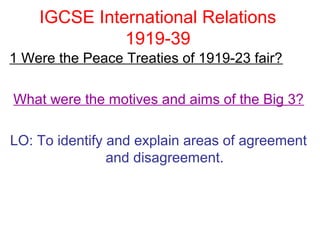
Lesson outline aims of the big 3
- 1. IGCSE International Relations 1919-39 1 Were the Peace Treaties of 1919-23 fair? What were the motives and aims of the Big 3? LO: To identify and explain areas of agreement and disagreement.
- 5. Lloyd George GB • Lloyd George was the youngest of the three, a cheerful rosy-faced man with startling blue eyes and a shock of white hair. (‘Hullo!’, a little girl once asked him, ‘Are you Charlie Chaplin?’ –Margaret MacMillan
- 7. Clemenceau France Clemenceau was also extraordinarily brave and stubborn. When the Germans advanced on Paris in 1914, the French parliament debated leaving. Clemenceau agreed: ‘Yes, we are too far from the front.’ –Margaret MacMillan
- 9. Woodrow Wilson -USA • The French ambassador in Washington saw ‘a man who, had he lived a couple of centuries ago, would have been the greatest tyrant in the world, because he does not seem to have the slightest conception that he can ever be wrong’.- Margaret MacMillan
- 10. Key Facts- France “A quarter of French men between eighteen and thirty had died in the war, over 1.3 million altogether out of a pre-war population of 40 million. France lost a higher proportion of its population than any other of the belligerents. Twice as many again of its soldiers had been wounded. In the north great stretches of land were pitted with shell holes, criss-crossed by trenches, marked with row upon row of crosses. Around the fortress of Verdun, site of the worst French battle, not a living thing grew, not a bird sang. The coal-mines on which the French economy depended for its power were flooded; the factories they would have supplied had been razed to the ground or carted away into Germany.”
- 11. Q1 What is the most complete way of describing the French aims at Paris? A) To cripple Germany as much as possible B) To rebuild the global economy C) They want land, and reparations and economic aid to rebuild France D) To reduce the German military E) To make the French militarily stronger F) Something else
- 12. Key Facts-UK • “Britain had already got much of what it wanted. The German fleet, which had challenged British power around the world, was safely in British hands, the surface ships in Scapa Flow and most of the submarines in Harwich. Its coaling stations, harbours and telegraph stations had been taken by Japan or the British empire. ‘If you had told the British people twelve months ago’, Lloyd George said in Paris, ‘that they would have secured what they have, they would have laughed you to scorn. The German Navy has been handed over; the German mercantile shipping has been handed over, and the German colonies have been given up. One of our chief trade competitors has been most seriously crippled and our Allies are about to become her biggest creditors. That is no small achievement.’ There was more: ‘We have destroyed the menace to our Indian possessions.’ Russia, whose southward push throughout the nineteenth century had so worried generations of British statesmen, was finished as a power, at least in the short run, and all along its southern boundaries, in Persia and the Caucasus, were British forces and British influence. Communications with India were more secure than ever. “ –Margaret MacMillan
- 13. Q2 Describe Lloyd George’s aims at the Paris Peace Conference A) Punish Germany to appease voters (but not too much); build Germany back up; ward off Communism; secure German overseas colonies B) Reduce German military might; especially the navy; Prevention of a second War C) Keep the French happy by making sure they felt safe e.g.: Rhineland D) Ensure Germany would continue as a trading partner (Britain was a trade based empire) E) Protect the empire (especially India) F) All of the above
- 14. Key Facts-USA • “In concentrating on the League, Wilson allowed much else to go by at the Peace Conference. He did not fight decisions that, by his lights, were wrong: the award of the German-speaking Tyrol to Italy, or the placing of millions of Germans under Czechoslovak or Polish rule. Such settlements once made were surprisingly durable, at least until the next war started. It would have been difficult in any case for the League to act, because its rules insisted on unanimity in virtually all decisions. His other equally dangerous assumption was that he had the support to get the League through Congress.” -Macmillan
- 15. Q3 Describe Wilson’s aims at the Paris Peace Conference A) Punish
- 16. The Roleplay • At the actual peace conference Lloyd George asked his staffers to take on the role of each of the main nations and debate from that perspective. He did this to prepare for the conference and the debates. • Try it! In small groups, allocate roles and try and debate from that point of view.
Notas del editor
- A quarter of French men between eighteen and thirty had died in the war, over 1.3 million altogether out of a pre-war population of 40 million. France lost a higher proportion of its population than any other of the belligerents. Twice as many again of its soldiers had been wounded. In the north great stretches of land were pitted with shell holes, criss-crossed by trenches, marked with row upon row of crosses. Around the fortress of Verdun, site of the worst French battle, not a living thing grew, not a bird sang. The coal-mines on which the French economy depended for its power were flooded; the factories they would have supplied had been razed to the ground or carted away into Germany.
- From Macmillan
- F) All of the above except B
